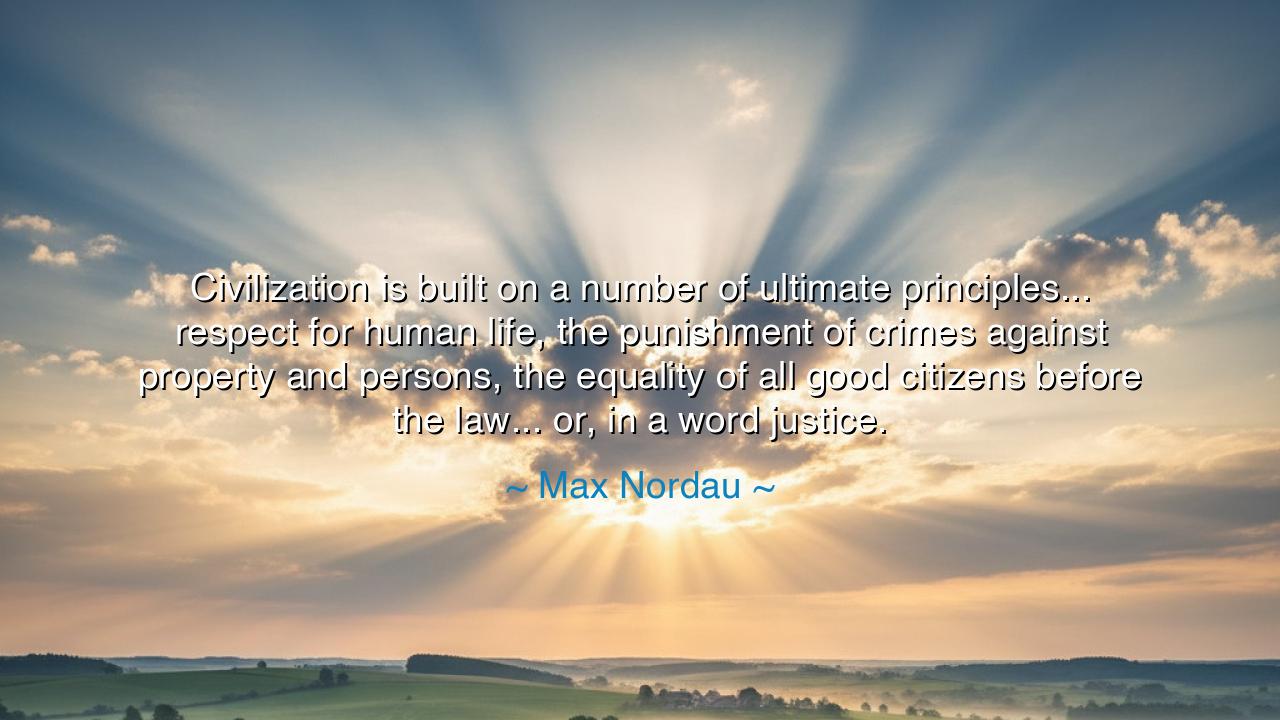
Civilization is built on a number of ultimate principles...
Civilization is built on a number of ultimate principles... respect for human life, the punishment of crimes against property and persons, the equality of all good citizens before the law... or, in a word justice.






The words of Max Nordau — “Civilization is built on a number of ultimate principles... respect for human life, the punishment of crimes against property and persons, the equality of all good citizens before the law... or, in a word, justice.” — ring like the voice of a sage calling to the conscience of mankind. They are not the mere observations of a philosopher, but a proclamation from one who looked upon the fragile architecture of human progress and sought to name its foundation. In his wisdom, Nordau reveals that beneath all art, science, and power, the cornerstone of civilization is not conquest or culture — but justice. For without justice, even the grandest empire becomes but a gilded ruin, and without respect for life and equality, humanity itself descends into darkness.
Max Nordau, the Hungarian-born philosopher, physician, and social critic, lived during an age of both brilliance and decay — the waning years of the 19th century, when Europe shone with intellect yet trembled beneath corruption and moral fatigue. A man of science and reason, he saw that civilization’s greatness was not measured by its inventions or wealth, but by its moral order. His declaration was a warning as much as a teaching: that the pillars of civilization stand not upon luxury or pride, but upon the sacred principles of respect for life, justice under law, and moral responsibility. When these are neglected, nations crumble from within, and all progress turns to dust.
The meaning of his words is as timeless as the dawn. Civilization, Nordau tells us, is not a natural state — it is an achievement, born of discipline, compassion, and law. The respect for human life is its first commandment, for without reverence for the sanctity of existence, society becomes a battlefield where the strong devour the weak. The punishment of crimes against property and persons is the second, for justice demands that wrongdoing must meet consequence, that peace cannot survive where evil goes unrestrained. And the equality of all before the law is the crown of these virtues — the belief that no birth, wealth, or station can place one above the standard of truth. These three principles together form the body of civilization, and the spirit that animates them all is justice, the divine balance that gives life meaning and order.
The ancients understood this long before Nordau gave it voice. In the laws of Hammurabi, carved into stone four thousand years ago, we see humanity’s first effort to make justice visible and eternal. In Solon’s Athens, where democracy was born, justice was held higher than power; even kings were subject to the law. And in the great moral systems of East and West — in the Dharma of India, the Mandate of Heaven in China, the Natural Law of Rome — all pointed toward the same truth: that civilization endures only when it protects the weak, restrains the wicked, and honors the inherent dignity of every person. When that balance breaks, chaos follows, and even mighty nations fall.
Consider the tragedy of Rome, whose greatness once rested on law and discipline but perished when greed and cruelty overtook justice. The Roman Republic, founded on the equality of its citizens and the rule of law, gave birth to centuries of peace and progress. But when corruption spread through its courts and tyranny silenced its Senate, Rome lost not only its freedom but its soul. The marble pillars still stood, the armies still marched — yet the spirit of civilization was gone. In that fall, we see Nordau’s warning fulfilled: without justice, no structure, no matter how splendid, can stand.
Max Nordau’s insight also speaks to our modern world, where progress dazzles but the heart often falters. He reminds us that true advancement is not measured in wealth or technology, but in how societies treat the most vulnerable, how they uphold truth in law, and how they preserve peace through fairness. A civilization that forgets justice may build towers to the sky, but it builds them upon sand. Yet a nation that keeps justice as its compass — that respects life, defends equality, and honors integrity — will endure through ages, shining as a light to all others.
Therefore, my children, let these words dwell in your hearts: justice is the lifeblood of civilization. Without it, freedom decays into anarchy, and peace into oppression. To live justly is not the duty of rulers alone — it is the sacred task of every citizen. Speak truth even when silence is safer; treat others as you would be treated; defend the innocent; and judge not by power, but by fairness. These are the actions by which civilization is renewed each day.
For as Max Nordau taught, the strength of nations is not found in their armies or their riches, but in their commitment to justice. When humanity cherishes life, punishes evil, and honors equality, then — and only then — does it rise above the beasts of the field and earn the name civilized. Let justice, then, be your guiding star — for where justice lives, there too lives the soul of mankind.






AAdministratorAdministrator
Welcome, honored guests. Please leave a comment, we will respond soon